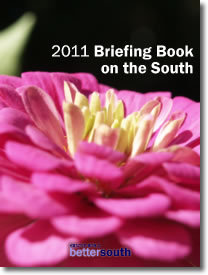OCT. 12, 2011 -- The American South has changed a lot in the 40 years since integration came to much of the region. Not only are educational systems better throughout the South, but the economy is more diverse. Millions of more people live here, bringing with them their talents, resources and drive. In fact, many of the larger communities and suburbs in the region look a lot like most of the rest of America -- with a little Southern charm thrown in on the side.
 But a new report with 36 statistical indicators compiled the Center for a Better South highlights how the South continues to suffer big gaps compared to the nation's other states. Although today's South is a diverse economic engine, it still has educational, environmental, poverty, health and other challenges brought on, in large part, by a long period of neglect following the Civil War.
But a new report with 36 statistical indicators compiled the Center for a Better South highlights how the South continues to suffer big gaps compared to the nation's other states. Although today's South is a diverse economic engine, it still has educational, environmental, poverty, health and other challenges brought on, in large part, by a long period of neglect following the Civil War.
Think about it this way. Hold your left hand, palm-side up, at waist level. Then hold your right hand, palm-side up, at chest level. Now, slowly raise both hands at the same speed. Soon, the left hand will get to same level as the right hand, but the right hand will be next to your head.
The example highlights how other states improved as the South was doing so too. Just as Southerners worked hard to get on par with the rest of America by investing to get better schools, roads, medical care and more, other states also invested. As a result, Southerners generally still remain on lists in the spots where they don't want to be -- at the bottom.
In other words, we're still playing catch-up. Some 150 years after the shots fired onto Fort Sumter in Charleston, the states of the American South still have a statistical hangover -- a Civil War hangover -- compared to the rest of the country. Let's look in just a few areas:
- Household income. Ten of the nation's 13 states with the lowest annual median household income are in the South, ranging from the lowest (Mississippi,37,985) to the 13th lowest (Florida,44,243). Only Virginia (6th highest,60,363) is above the national average (49,445).
Fortunately, the 47 pages of data about Southern states in the 2011 Briefing Book on the South are not all doom and gloom. The report offers some good news. Pick through the data and you'll find states where tax burdens are low, the business environment is good, the teacher climate in schools is outstanding and a high percentage of students go to college.
We offered the report to Southern leaders so they could think about how to redouble efforts to leapfrog our region away from our unique Civil War hangover through creative policy efforts to improve education and health care while reducing poverty and unemployment. As the Athens Banner-Herald noted in an editorial when considering the book's information about Georgia:
"Certainly, the aggregate statistics noted in the report don't reflect the clear fact that some parts of the state lie well outside the dismal overall percentages. Still, the fact that the statistics show Georgia to be among the nation's dumber, sicker and poorer states is a clear signal that there's plenty of room for improvement. You can find more information from the "2011 Briefing Book" online at bettersouth.org. Take a look, and weep softly."
The American South is one of the world's greatest places to live. But if our leaders don't face or understand what is ailing our region, they won't be able to come up with prescriptions to make us better. And after 150 years, it's about time to really knuckle down.
